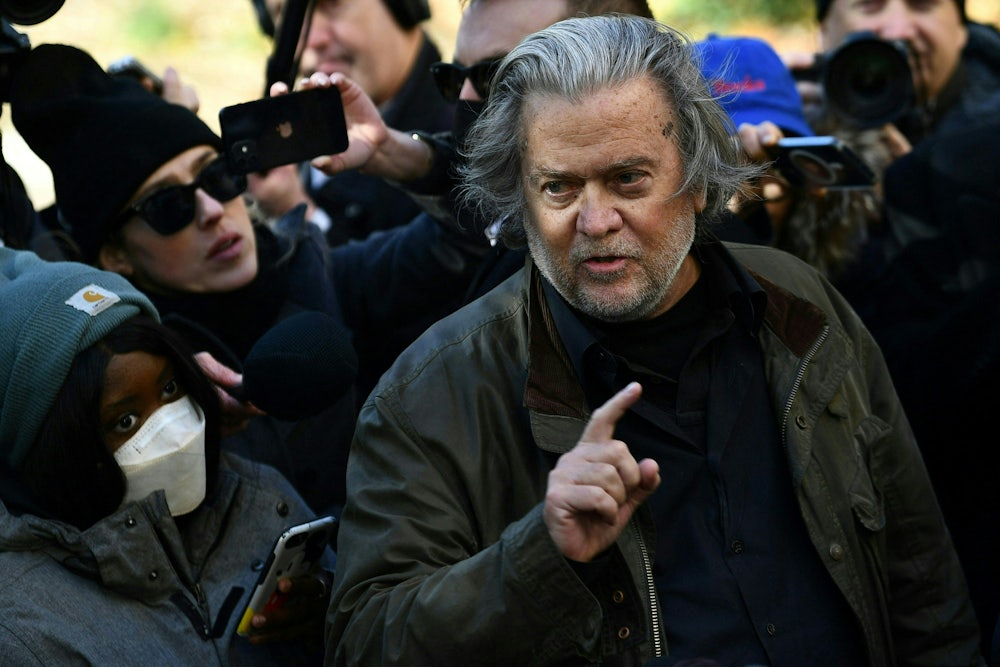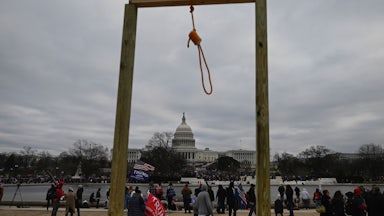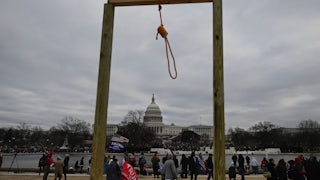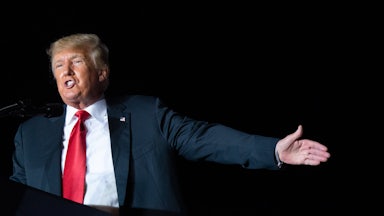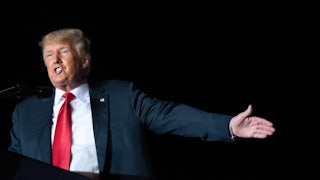Steve Bannon, the far-right Trump adviser who briefly served in the White House, was indicted last week by a federal grand jury for defying a subpoena by the House January 6 committee. The case is the first criminal contempt proceeding brought as part of the congressional panel’s inquiry into the attack on Congress 10 months ago. Given the stonewalling by other key witnesses, it may not be the last.
It’s tempting to see Bannon’s indictment as a victory for Congress and its oversight powers. Representatives Bennie Thompson and Liz Cheney, the committee’s chair and vice chair, treated it as one. “Steve Bannon’s indictment should send a clear message to anyone who thinks they can ignore the Select Committee or try to stonewall our investigation: no one is above the law,” they said in a statement on Friday. “We will not hesitate to use the tools at our disposal to get the information we need.”
But the Bannon case looks more a nadir of sorts for congressional oversight power. Congress, of course, has held hearings and conducted inquiries since the founding of the republic. But we’re living in a different world now. Thanks to a corrosive mixture of hyperpartisan conflict and constitutional hardball, lawmakers have found it increasingly difficult to carry out those responsibilities through their own inherent powers. It’s hard to see how Congress ever recovers the full strength it once had.
So far, the January 6 committee has subpoenaed 35 people connected to the Trump administration, the Stop the Steal protest organizers, or both. It has also requested a broad range of documents from the National Archives, which has physical and legal custody of the Trump White House records. There was also a hearing in which four police officers who were attacked by pro-Trump rioters gave public testimony for the first time. Though committee members have suggested they’ll eventually issue a report, the timeline for when and how it will all come together is far from clear.
How is this oversight process supposed to work? Say that a House or Senate committee wants information on some matter relevant to its legislative powers from a person, organization, or business. The committee can either semi-informally request the information, whether it be testimony or documents, or issue a formal subpoena for it. If there are any legal questions or disputes, the committees and the recipient usually try to reach an accommodation of some kind, with actual litigation as a last resort.
After Democrats captured the House in 2018, however, Trump embraced a scorched-earth approach to most high-profile congressional investigations. In litigation battles over allowing testimony from his aides and handing over his financial records, he sought to delay and drag out litigation as long as possible. During his presidency, that meant pushing its outcome past the 2020 presidential election, when he would either be reelected or voted out and thus no longer at risk for political fallout from any revelations. Now that he’s out of office, Trump’s new de facto deadline is after the 2022 midterms. By early 2023, Republicans will have likely gerrymandered themselves back into control of the House, and the January 6 committee will almost certainly cease to exist.
The other half of Trump’s war involved raising extreme claims of executive power, executive privilege, executive deference, executive immunity, and whatever other wild interpretation of presidential authority would help him wriggle out of trouble. During the Russia investigation, his lawyers successfully argued that the Justice Department couldn’t investigate a sitting president. When the House sought Trump’s financial records, those lawyers told the courts that Congress couldn’t investigate whether a president committed any crimes because that was a law enforcement function, not a legislative one. And when the House impeached Trump for inciting an attack on Congress, his lawyers told the Senate that his actions were protected by the First Amendment. Heads he wins, tails you lose.
Every American deserves vigorous legal advocacy, of course, and not every novel constitutional claim should be dismissed out of hand. That said, Trump’s presidential maximalism runs counter to most Americans’ understanding of how a lawful government should operate. In the financial records case I mentioned earlier, Trump’s lawyers told a federal judge that, under their reading of the Constitution, the congressional inquiries into both the Watergate scandal during the Nixon years and the Whitewater scandal of the Clinton years were both unconstitutional. “Congress can’t look into whether the president did crimes” is such an outlier position that neither the judge nor, later, the Supreme Court agreed with it. But the justices did punt the financial records case for reconsideration by the lower courts under a higher standard, somewhat vindicating Trump’s run-out-the-clock strategy.
The January 6 committee is facing a slew of similar stonewalls. First, Trump argued that the National Archives couldn’t release the subpoenaed documents to the committee on executive privilege grounds. There are a few problems with that argument, namely that Trump is no longer the president and thus can’t invoke executive privilege anymore. The Presidential Records Act, or PRA, only allows him to ask the sitting president to withhold them on his behalf. Biden understandably declined to do so. Not to worry, however, because Trump had a back-up argument: The PRA itself is unconstitutional, and Trump possesses some sort of inherent residual power as a former president to stifle Congress.
Since there is no ex-president clause in the Constitution, and the document is otherwise pretty clear on when a person is or isn’t president, Judge Tanya Chutkan rejected the argument in strong terms. “[Trump] does not acknowledge the deference owed to the incumbent President’s judgment. His position that he may override the express will of the executive branch appears to be premised on the notion that his executive power ‘exists in perpetuity,’” she wrote in her ruling against Trump earlier this month. “But presidents are not kings, and [Trump] is not president.”
Second, and perhaps more troublingly, Trump is urging the various Trumpworld associates who receive a subpoena from the committee to defy them on executive privilege grounds. This sweeping claim purportedly applies not only to genuine White House employees like former chief of staff Mark Meadows but also to figures like Bannon, who had left the Trump White House roughly three years before any of the events relevant to the committee’s inquiry. Bannon’s unambiguous status as a nonprivileged person here is probably why the Justice Department felt so comfortable in prosecuting him. But the claims by Meadows and other associates may force the committee to litigate them further in court, delaying the process even more.
The January 6 committee has some significant advantages at the moment. For one, it has an exceedingly friendly executive branch on its side: the Biden administration that the January 6 rioters had sought to prevent in the first place. The federal courts, for now, also appear unwilling to let Trump draw out the legal proceedings indefinitely. When he appealed Chutkan’s decision to the D.C. Circuit Court of Appeals last week, the designated three-judge panel agreed to hold a hearing on November 30—a fairly expeditious pace for a federal appeals court.
But those outcomes are largely contingent on the goodwill of the other two branches of government. That friendliness is likely higher now because of the gravity of what the January 6 committee is investigating. When up against more adversarial administrations in the future, lawmakers may have a far harder time persuading the Justice Department to bring criminal contempt charges against someone who defies them. And even if it does, Trump himself set a precedent of using the pardon power to undermine congressional inquiries when he pardoned Roger Stone last year after he was convicted of lying to lawmakers during the Russia investigation.
The Trump era, in other words, showed just how much of Congress’s oversight and investigatory powers rely on the good faith of those who are subject to them. Lawmakers and experts have discussed ways to address this gap through legislation and other reforms with varying degrees of constitutionality. But the root of the problem is that a sharply divided Congress has few inherent options to protect its own authority—especially when faced with a political faction that views all opposition as illegitimate and will stop at nothing to protect its interests. The January 6 rioters may not have gotten the 2020 election overturned, but the degradation of Congress’s ability to provide a bulwark against political corruption might be considered a significant consolation prize.
